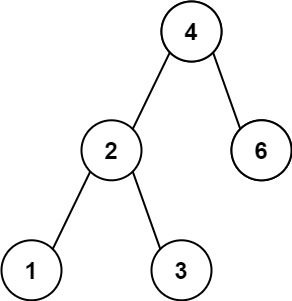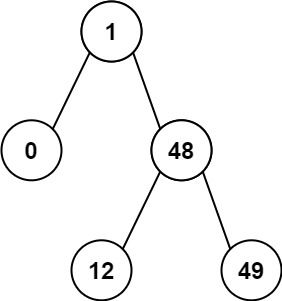| comments | difficulty | edit_url | tags | |||||
|---|---|---|---|---|---|---|---|---|
true |
Easy |
|
Given the root of a Binary Search Tree (BST), return the minimum difference between the values of any two different nodes in the tree.
Example 1:
Input: root = [4,2,6,1,3] Output: 1
Example 2:
Input: root = [1,0,48,null,null,12,49] Output: 1
Constraints:
- The number of nodes in the tree is in the range
[2, 100]. 0 <= Node.val <= 105
Note: This question is the same as 530: https://leetcode.com/problems/minimum-absolute-difference-in-bst/
The problem requires us to find the minimum difference between the values of any two nodes. Since the inorder traversal of a binary search tree is an increasing sequence, we only need to find the minimum difference between the values of two adjacent nodes in the inorder traversal.
We can use a recursive method to implement the inorder traversal. During the process, we use a variable
The time complexity is
# Definition for a binary tree node.
# class TreeNode:
# def __init__(self, val=0, left=None, right=None):
# self.val = val
# self.left = left
# self.right = right
class Solution:
def minDiffInBST(self, root: Optional[TreeNode]) -> int:
def dfs(root: Optional[TreeNode]):
if root is None:
return
dfs(root.left)
nonlocal pre, ans
ans = min(ans, root.val - pre)
pre = root.val
dfs(root.right)
pre = -inf
ans = inf
dfs(root)
return ans/**
* Definition for a binary tree node.
* public class TreeNode {
* int val;
* TreeNode left;
* TreeNode right;
* TreeNode() {}
* TreeNode(int val) { this.val = val; }
* TreeNode(int val, TreeNode left, TreeNode right) {
* this.val = val;
* this.left = left;
* this.right = right;
* }
* }
*/
class Solution {
private final int inf = 1 << 30;
private int ans = inf;
private int pre = -inf;
public int minDiffInBST(TreeNode root) {
dfs(root);
return ans;
}
private void dfs(TreeNode root) {
if (root == null) {
return;
}
dfs(root.left);
ans = Math.min(ans, root.val - pre);
pre = root.val;
dfs(root.right);
}
}/**
* Definition for a binary tree node.
* struct TreeNode {
* int val;
* TreeNode *left;
* TreeNode *right;
* TreeNode() : val(0), left(nullptr), right(nullptr) {}
* TreeNode(int x) : val(x), left(nullptr), right(nullptr) {}
* TreeNode(int x, TreeNode *left, TreeNode *right) : val(x), left(left), right(right) {}
* };
*/
class Solution {
public:
int minDiffInBST(TreeNode* root) {
const int inf = 1 << 30;
int ans = inf, pre = -inf;
auto dfs = [&](auto&& dfs, TreeNode* root) -> void {
if (!root) {
return;
}
dfs(dfs, root->left);
ans = min(ans, root->val - pre);
pre = root->val;
dfs(dfs, root->right);
};
dfs(dfs, root);
return ans;
}
};/**
* Definition for a binary tree node.
* type TreeNode struct {
* Val int
* Left *TreeNode
* Right *TreeNode
* }
*/
func minDiffInBST(root *TreeNode) int {
const inf int = 1 << 30
ans, pre := inf, -inf
var dfs func(*TreeNode)
dfs = func(root *TreeNode) {
if root == nil {
return
}
dfs(root.Left)
ans = min(ans, root.Val-pre)
pre = root.Val
dfs(root.Right)
}
dfs(root)
return ans
}/**
* Definition for a binary tree node.
* class TreeNode {
* val: number
* left: TreeNode | null
* right: TreeNode | null
* constructor(val?: number, left?: TreeNode | null, right?: TreeNode | null) {
* this.val = (val===undefined ? 0 : val)
* this.left = (left===undefined ? null : left)
* this.right = (right===undefined ? null : right)
* }
* }
*/
function minDiffInBST(root: TreeNode | null): number {
let [ans, pre] = [Infinity, -Infinity];
const dfs = (root: TreeNode | null) => {
if (!root) {
return;
}
dfs(root.left);
ans = Math.min(ans, root.val - pre);
pre = root.val;
dfs(root.right);
};
dfs(root);
return ans;
}// Definition for a binary tree node.
// #[derive(Debug, PartialEq, Eq)]
// pub struct TreeNode {
// pub val: i32,
// pub left: Option<Rc<RefCell<TreeNode>>>,
// pub right: Option<Rc<RefCell<TreeNode>>>,
// }
//
// impl TreeNode {
// #[inline]
// pub fn new(val: i32) -> Self {
// TreeNode {
// val,
// left: None,
// right: None
// }
// }
// }
use std::cell::RefCell;
use std::rc::Rc;
impl Solution {
pub fn min_diff_in_bst(root: Option<Rc<RefCell<TreeNode>>>) -> i32 {
const inf: i32 = 1 << 30;
let mut ans = inf;
let mut pre = -inf;
fn dfs(node: Option<Rc<RefCell<TreeNode>>>, ans: &mut i32, pre: &mut i32) {
if let Some(n) = node {
let n = n.borrow();
dfs(n.left.clone(), ans, pre);
*ans = (*ans).min(n.val - *pre);
*pre = n.val;
dfs(n.right.clone(), ans, pre);
}
}
dfs(root, &mut ans, &mut pre);
ans
}
}/**
* Definition for a binary tree node.
* function TreeNode(val, left, right) {
* this.val = (val===undefined ? 0 : val)
* this.left = (left===undefined ? null : left)
* this.right = (right===undefined ? null : right)
* }
*/
/**
* @param {TreeNode} root
* @return {number}
*/
var minDiffInBST = function (root) {
let [ans, pre] = [Infinity, -Infinity];
const dfs = root => {
if (!root) {
return;
}
dfs(root.left);
ans = Math.min(ans, root.val - pre);
pre = root.val;
dfs(root.right);
};
dfs(root);
return ans;
};
